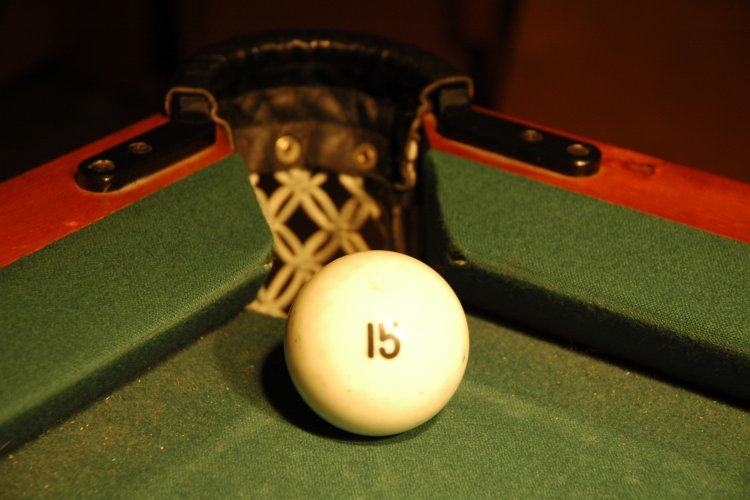Lou:
Great post. While aiming "systems" (which ghostball is not, btw) may help a beginner/practiced-novice arrive at a fire control "solution," they are not "be all, end all" solutions to the game. I've even heard one advocate of a currently-discussed-here aiming system call his a pool "cheat code," which just goes to show the underlying motive behind this aiming "system."
You know something? Pool seems to be the only cue sport where we see these "short cuts" or "cheat codes" to aiming even being discussed. And yet pool is:
- The one pocket-based cue sport where the pocket size themselves, in relation to the object ball, are the most gracious! They are much bigger targets than the pockets in other cue sports. In Snooker, the pockets are only a small percentage larger than the object balls themselves:
...and in Russian Pyramid, the ball-to-pocket-size ratio is even smaller than that (2mm clearance on either side of the object ball!):
- The size of the table in pool is smaller. Even the "mighty" 9-footer in pool PALES in comparison to the enormous 12-footer tables common in other cue sports, like Snooker and Russian Pyramid.
So we have a cue sport where the tables are smaller, the pockets are bigger, and yet,
we Americans *still* need a cheat code! If we take a look at those other cue sports like Snooker and Russian Pyramid, we don't see these exotic aiming systems being discussed.
In snooker, the main aiming system used is "dummy ball," as the English call what we know here on these boards as ghostball. And this is especially true in Russian Pyramid, where the main shots taken are carom shots -- pocketing a ball by caroming it of another ball, into those unforgiving pockets. Granted, good Pyramid players shoot their shots at speed, so as to bend the horns of the pocket out of the way, but one still must be accurate to within at most, 5mm on either side. On a 12-foot table, mind you!
I think the problem many aiming-system devotees suffer from, is worrying too much about aiming, and not enough on fundamentals. In the snooker and Russian Pyramid world, fundamentals are the paramount topic of discussion. Your ability to deliver the cue ball at the intended spot on the object ball is your highest priority as a shooter. The "correct" spot on the object ball to pocket it, is secondary, and comes with time.
As another poster said (Williebetmore?), delivering that cue ball accurately is DAMN HARD. The problem with pool players for the most part, are lack of strong repeatable fundamentals. (There, I said it.) In what other pocket-based cue sport do you find the player adopting a stance where his/her head is NOT positioned at the same point / same sight-line above the cue on every single shot (e.g. chin not resting on the cue)? None other than pool. In what other pocket-based cue sport do you find advertising announcements being made about some new "Perfect Aim" system that is actually based on the correct placement of head and eyes above the cue, that guarantees better results, as if it's some world-changing "discovery"? None other than pool.
Honestly, I think we pool players need to take a strong look at how things are done in other, more-demanding cue sports. Want to see some eye-popping ball pocketing skills? Take a look at this:
http://youtube.com/watch?v=eEZxTyByg8k
Or, for even
smaller pockets (clearance-wise), in Russian Pyramid which uses lots of caroms to pocket balls -- what seems to us to be "cue ball scratch fouls" are actually points in Pyramid:
http://youtube.com/watch?v=IiM3tBIB9Qs
Now how do we Americans feel about our "cheat codes" for pocketing balls?
Hope I've opened at least a couple eyes.
With no disrespect,
-Sean

